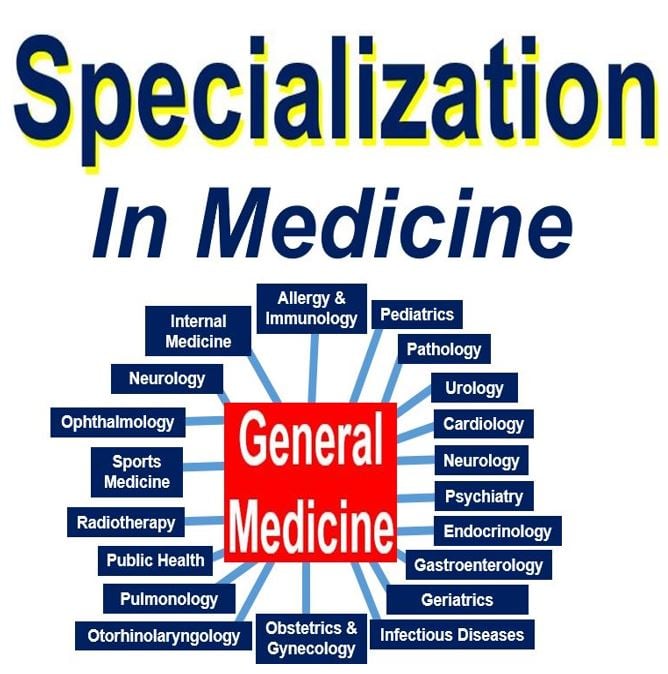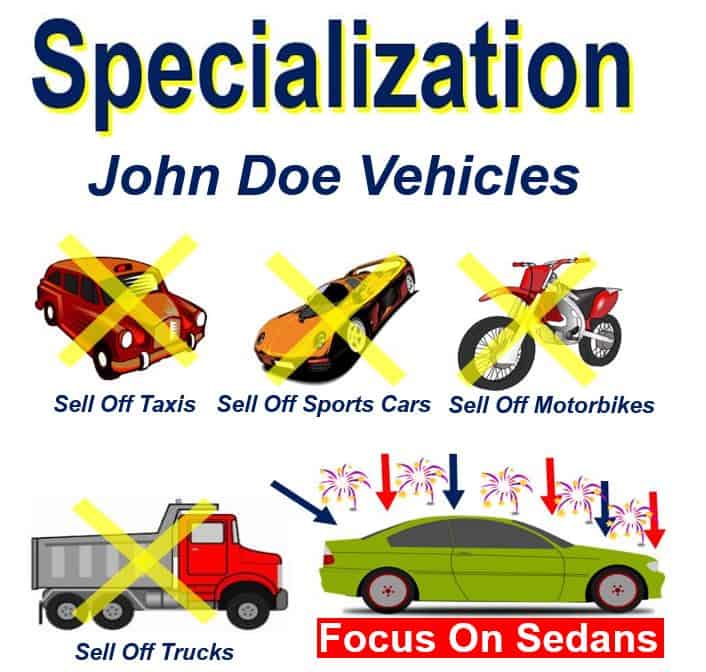What is specialization? Definition and meaning
Specialization is a strategy developed by a business to focus on the production of a very limited range of products or services in order to gain maximum productivity, expertise and leadership in the targeted field. Companies that specialize say they get a better return on investment.
Technological advancements have significantly bolstered the capability for businesses to specialize, allowing for more precise targeting of resources and expertise in their chosen domains.
It is the opposite of diversification – when a company spreads from its core activity into new areas.
It may refer to whole countries
Specialization may also refer to regions of a country or even whole nations. Several countries around the world specialize in producing goods or delivering services that are native to their geographical area, and they import other goods and services.
It may refer to smaller entities
The term may also refer to an agreement within an organization, group or community under which the members most suited for a specific task or activity assume greater responsibility for its performance and execution. Police officers focus on maintaining law and order, doctors concentrate on keeping people healthy, accountants specialize in balancing the books, etc.

Specialization – division of labor
The division of labor refers to the separation of tasks in a community, organization or company so that workers or members may specialize.
People, organizations and countries are blessed with or acquire specialized capabilities and either form combinations or trade to exploit those capabilities in others as well as their own.
Adam Smith (1723-1790), a Scottish pioneer of political economy and moral philosopher, considered by many as the ‘father of modern economics’ wrote about the division of labor right at the beginning of his famous work – An Inquiry into the Nature and Causes of the Wealth of Nations.

Mr. Smith foresaw the essence of industrialism by determining that the division of labor – the specialization of work duties – boosts productivity. His example was the making of pins.
The division of labor – specialization – creates specialists who need coordination. The coordination is facilitated by grouping these people with specific tasks and skills together in departments. Departments can be grouped according to functions, products, customer types, and geographic location.
Specialization is the focus of company training programs, personal career ambitions, and choices in education. A person who excels in math (UK: maths) but is not a good writer, when at college will focus on subjects that rely heavily on mathematics, and will become a mathematician, engineer, physicist, statistician, accountant, etc.
Specialization – the future for many companies
During the 20th century, the path followed by most companies was diversification – widening their range of products and services and expanding into new geographical locations.
Since the turn of the century, the tendency has moved in the opposite direction – towards specialization. More and more companies have been selling off their non-core sections and focusing resources in one direction.
This move towards specialization is especially evident in the pharmaceutical industry. As far as drugmakers are concerned, corporations that do not specialize are doomed.
Big pharma has been going through a very rough time, with assaults from generic drug manufacturers, the rise of low-cost drugmakers based in emerging nations, and legal challenges to patents on blockbuster medications.
Without the specialization of members of our workforce – Division of Labor – our economy would be extremely primitive. Each individual specializes in what he or she is good at.

As a survival strategy, the largest pharmaceutical giants are building dominant positions in narrower business lines or focusing their resources on drugs that target rare diseases.
In the world of human and animal medications, specialization is ‘in’, while diversification is the kiss of death.
The Cambridge Dictionary has the following definitions of specialization:
“1. A particular area of knowledge or the process of becoming an expert in a particular area. 2. (Biology) The development in organisms of cells that have particular purposes.”
Specialization not only streamlines operations but also often results in increased innovation as companies or individuals push the boundaries of their narrow fields to gain competitive advantage.
Compound phrases with specialization
A compound phrase is a term consisting of two or more words. For example, the term ‘career specialization’ is a compound phrase. Here are some compound phrases which contain the term ‘specialization’:
-
Academic specialization
A student or academic’s concentrated focus on a particular field of study.
For example: “After years of academic specialization in marine biology, she published a groundbreaking study on coral reef ecosystems.”
-
Market specialization
A business strategy where a company targets a specific market niche.
For example: “Their market specialization in eco-friendly products has attracted a dedicated customer base concerned with sustainability.”
-
Technical specialization
The acquisition of specific technical skills or knowledge in a particular area.
For example: “His technical specialization in cybersecurity software positioned him as a sought-after expert in the field of information technology.”
-
Product specialization
A focus on the production and development of a limited range of products.
For example: “The company’s product specialization in organic skincare has differentiated them in a crowded marketplace.”
-
Service specialization
Providing a specific, often niche, service to customers or clients.
For example: “With her service specialization in language translation for medical documents, she became an indispensable asset to hospitals and clinics worldwide.”
Derivatives of ‘special’
The root word of ‘specialization is ‘special.’ The word ‘special,’ which is primarily an adjective, can be the root for various others words, including nouns and adverbs, as you can see below:
-
Special (Adjective)
Having a distinct or particular quality, purpose, or significance.
For example: “She received a special award for her outstanding contributions to the community.”
-
Specialty or Speciality (Noun)
A particular area of expertise or focus.
For example: “Italian cuisine is his specialty, and he makes an exceptional risotto.”
-
Specialist (Noun)
A person who concentrates primarily on a particular subject or activity; a person highly skilled in a specific and restricted field.
For example: “She is a specialist in environmental law and advises companies on sustainability practices.”
-
Specialize (Verb)
To concentrate on a particular area of study or activity.
For example: “He decided to specialize in pediatric medicine because he loves working with children.”
-
Specially (Adverb)
For a particular purpose, specially done or made.
For example: “This cake was specially made for your birthday, with all your favorite flavors.”
Video – What is Specialization?
This interesting video presentation, from our YouTube partner channel – Marketing Business Network, explains what ‘Specialization’ is using simple and easy-to-understand language and examples.

